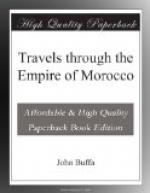The general language of the country is Arabic; but in the inland countries, in the provinces of Suz, Tafilet, and Gessula, the ancient African language is still spoken. Those remote districts are now under the sovereignty of the Emperor of Morocco; but I am told they contain nothing particularly curious, except an immense number of pelicans and ostriches, the latter so strong as to be able to carry a man upon their backs. I one day saw a Moor riding in a court here upon one, which he had got from those parts, and tamed for. show.
The Moors write in the manner of the Hebrew language, from right to left; they are wonderfully expeditious in it, and their seals are very neat. Public schools have lately been established in all the towns and villages of these states; but, as the children are taught by their priests, a set of superstitious and fanatic people, no great benefit, to change or improve their manners, can accrue from such an institution.
I believe, in a former letter I told you that the peasantry reside in tents; I have however observed a few huts built of clay, but very few. In the centre of both the huts and tents, there is a hole dug in the ground, where they make a fire, with an outlet in the roof to vent the smoke. They generally burn wood, or a species of charcoal, in the preparation of which they contrive to deprive it of the baneful effects usually experienced from the use of it in England. They have mats spread round the fire, upon which they sit in the day, and sleep at night. They are so parsimonious, that they live the greater part of the year on fruit, vegetables, and fish, though they supply the markets with abundance of fowls (of which they rear immense numbers), butter, &c. &c. Their chief defence at night is their dogs; each tent is provided with one, and they are so vigilant, that they give instant notice of the approach of intruders; and when the alarm is communicated to the whole of them, it is scarcely possible to conceive the effect. The habit of the peasantry is the same both winter and summer, and consists of a thick garment (frequently old and tattered), a short capote, a greasy turban, and a pair of yellow slippers. They sometimes throw round them a coarse white haik, which also serves for a bed and covering in the night, as many of them lie upon the bare ground in the open air before their tents.




